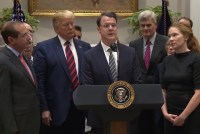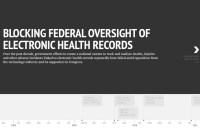Latest KFF Health News Stories
Most of the 2020 Democratic presidential candidates agree on certain positions — like supporting the removal of the Hyde amendment — that may have divided the field in previous eras. “What you’ve seen is that it’s no longer OK for any candidate just to say they’re pro-choice,” said Jacqueline Ayers, of Planned Parenthood. “They’re being very specific on how our rights are under attack, how access to abortion is being undermined in this country, and putting forth plans to protect and expand rights.”
A so-called “public option” would allow people to buy a government-run health plan that competes with the private marketplace. In previous years, the policy was considered extreme, while now it’s starting to sound like the moderate option in the current political landscape. Meanwhile, Politico takes a look at the army being built to fight “Medicare for All.”
During open enrollment season, health experts say to watch out for “junk” insurance plans that were expanded under the Trump administration and don’t have to meet standards set by the Affordable Care Act. Meanwhile, investors are betting that the Supreme Court rules in favor of insurers in a case over “risk corridor” payments.
First Edition: November 25, 2019
Today’s early morning highlights from the major news organizations.
Not Yesterday’s Cocaine: Death Toll Rising From Tainted Drug
While the U.S. continues to focus mainly on the opioid crisis, cocaine is quietly making a comeback and has become one of the biggest overdose killers of African Americans when tainted with fentanyl.
Last-Minute Loophole Could Undermine Texas Law Against Surprise Medical Bills
Texas passed a bipartisan law against surprise medical billing, but advocates warn that a proposed rule could severely weaken it, continuing to allow surprise bills outside of emergencies.
UVA Doctors Decry Aggressive Billing Practices By Their Own Hospital
In the wake of a Kaiser Health News investigation, doctors want the University of Virginia’s health system to stop suing its patients over unpaid bills.
Readers React: UVA Doctors Outraged Over Their Own Health System’s Billing Practices
Kaiser Health News gives readers a chance to comment on a recent batch of stories.
Must-Reads Of The Week From Brianna Labuskes
Newsletter editor Brianna Labuskes wades through hundreds of health care policy stories each week, so you don’t have to.
This Story Contains A Warning That Might Cause Alarm — Or Apathy
Proposition 65 requires California businesses to label products and buildings with warnings about substances the state deems as toxic, ranging from aloe vera to asbestos. A state panel plans to debate whether to add acetaminophen, the active ingredient of common over-the-counter medications such as Tylenol, to the toxics list, raising questions about the value of these ubiquitous warnings.
Timeline: History Of Blocking Regulation Of Electronic Health Records
Over the past decade, government efforts to create a national system to track and analyze deaths, injuries and other adverse incidents linked to electronic health records repeatedly have failed amid opposition from the technology industry and its supporters in Congress.
Opinion writers weigh in on these health topics and others.
Media outlets report on news from Ohio, California, Colorado, Maryland, Florida, Wisconsin, Wyoming, Connecticut, and Georgia.
The guns are growing in popularity because they don’t require serial numbers and can be assembled by people who think they wouldn’t pass a background check. In other news on gun violence: NRA relaunches efforts against Florida’s age restrictions and a fatal shooting prompts changes at a D.C. hospital.
Each week, KHN finds interesting reads from around the Web.
Houses Of Worship Lead Fight Against Stigma Of HIV In The South Reversing History Of Homophobia
Researchers say the efforts by the churches’ that are predominately made up of black parishioners are important because black Americans have higher levels of homophobia and stigma about HIV than other groups and are less likely to seek medical help. In other news on HIV, New York City sees a dip in new cases. Public health news is on smaller needles for vaccines, lab-grown mosquitoes, early menopause risks, inactive teens, recall of salad products, a safety bill for nurses, treatments for spinal cord injuries, and food shopping in crime-ridden areas.
Democratic Gov. Tom Wolf said the bill’s requirements were “not consistent with the fundamental rights” guaranteed by the Constitution’s 14th Amendment.
Stat hosted a summit for top executives and researchers, policymakers, and patient advocates to discuss the future of medicine and the pharmaceutical landscape.
Even those who have been prioritized with the most need are facing a daunting wait-list for care. “We need to help legislators understand in the long run it’s better to support these individuals now,” said Erin Suelmann, executive director of the Down Syndrome Association of Greater St. Louis. “It’s a moral issue, too. These are our most vulnerable population and we need to be caring for them.” Medicaid news comes out of Ohio, Colorado and Pennsylvania, as well.
Lawyers have determined that the Education Department could not legally move ahead with the automatic loan forgiveness until the agency first rewrote the regulations governing the program. Meanwhile, two marathon enthusiasts run to raise awareness for veteran suicide.









